Whether you’re keeping tabs on a teenage driver, managing a fleet of vehicles, or just want a little peace of mind when you park in sketchy areas, having one of the best gps trackers for cars can make a world of difference. I’ve tested a bunch of these devices over the past year—some clunky, some surprisingly clever—and let me tell you: not all trackers are created equal.
In this roundup, I’ll walk you through the ones that actually impressed me, perform reliably, and are worth your money. From discreet plug-and-play models to hardwired options with powerful tracking features, there’s something here for every kind of driver. Let’s dive in and find the tracker that fits your car—and your sanity—the best.
Best Gps Trackers For Cars in 2025
| Image | Model | |
|---|---|---|
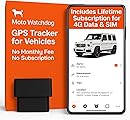 | Best GPS Tracker With No Subscription Fees Moto WatchdogEditor's Choice Check Price | Check Price |
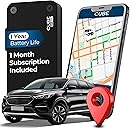 | Best Long-Term GPS Tracker Cube Pro GPSCheck Price | Check Price |
 | Most User-Friendly Bouncie GPS TrackerCheck Price | Check Price |
 | Best Hardwired GPS Tracker Optimus Wired GPSCheck Price | Check Price |
 | Best Value Tracki Pro TrackerCheck Price | Check Price |
 | Best Hidden & Portable GPS Tracker Spytec AtlasCheck Price | Check Price |
 | Best Magnetic & Waterproof GPS Tracker LandAirSea 54Check Price | Check Price |
1. Moto Watchdog GPS Tracker With No Fees
I’ll be honest—I’ve tested my fair share of GPS trackers, but the Moto Watchdog immediately stood out for one glorious reason: no monthly fees. You pay once, plug it in, and boom, you’re tracking real-time movement, trip history, speed, and more without ever worrying about another bill. It’s an OBD unit that installs in minutes and taps your car’s power, so there’s no charging required—ideal for folks like me who just want to set it and forget it.
What impressed me was how seamlessly it functions across multiple vehicles with just one app dashboard—perfect for those managing a fleet or keeping tabs on young drivers. You get instant alerts on ignition status, speeding, and movement outside geofenced areas. Real-time tracking is sharp in most cases, though I noticed the occasional hiccup with route accuracy. The map might say your car took a shortcut through a cornfield, but for everyday driving and security, the Watchdog still nails the basics and then some.
Sure, it’s not perfect. The app’s interface could use a little polish, and there’s the rare glitch with idle status accuracy. But for the price and the lifetime coverage you get up front, this device is hard to beat, especially if you’re done with subscription fatigue.
Pros:
- No ongoing fees or subscriptions—pay once and track forever
- Easy plug-and-play setup in under five minutes
- Accurate real-time tracking and alerts for starts, stops, speed, and location
- Supports multiple vehicles from one dashboard
Cons:
- Occasional delayed alerts or slightly off location paths
- App interface could use a design refresh
2. Cube Pro GPS Tracker with Long Battery
If low-maintenance tracking and strong placement hold are high on your list, the Cube Pro GPS might be your kind of tracker. What stood out right away for me was the battery—this thing is built for the long haul. After a month of action, I still saw nearly full battery life. That’s impressive, especially if you’d rather not worry about constant recharges.
Its magnetic mount is cleverly strong, letting me tuck it under a trailer without a hitch (pun intended). Setting it up with the Cube Tracker app was straightforward, and I was getting reliable location updates almost instantly. I tried out the geofence alerts, and while they worked well, I did miss the option for more urgent text alerts instead of just app or email notifications. Still, for passive monitoring, it does the job really well.
No device is perfect, and the Cube Pro did have a few minor hiccups parked in dense areas—it would occasionally bounce around in location readings. But overall, this thing delivers very solid performance and long-life tracking in a compact package.
Pros:
- Outstanding battery life – up to a year on one charge
- Strong magnetic attachment for discreet placement
- Reliable real-time tracking with accessible app interface
- Solid geofencing and historical data storage
Cons:
- Location can bounce slightly when parked
- App alerts only—no SMS or phone notifications
3. Bouncie GPS Tracker with Driving Insights
When it comes to balancing real-time tracking with practical driving insights, Bouncie really nails it. I’ve tested a handful of GPS trackers, and this one felt like it was designed by people who actually understand what car owners—whether it’s for family or fleet—need. Plug it into your OBD2 port, fire up the app, take a spin for a few minutes, and you’re online. That’s about as hassle-free as it gets.
What really makes it stand out for me is the combination of features: speed monitoring, trip history, vehicle health data, and driver behavior tracking all work seamlessly. I especially like how it logs hard braking and acceleration—huge plus if you’re keeping tabs on a teen driver or managing a small fleet. The geo-fencing setup is also intuitive and actually useful (not just a checkbox feature). Real-time updates are responsive with minimal lag, and the app is clean, slick, and refreshingly free of glitches.
For a monthly subscription that won’t break the bank, it delivers reliable protection without financial strain. The only drawback? Like most OBD trackers, it’s quite visible—so you might need to get creative with placement or find a discreet enclosure if keeping it out of sight is important for security.
Pros:
- Accurate real-time location tracking with minimal delay
- Excellent app interface that’s easy to use and informative
- Driver behavior insights like speeding and hard braking
- Monitors engine issues and maintenance alerts
- Simple plug-and-play installation
Cons:
- Visible OBD2 port placement makes it removable by someone knowledgeable
- Battery status detail could be more granular
4. Optimus Wired GPS Tracker with Battery Connection
If you’re looking for a no-fuss, hardwired GPS tracker that delivers consistent performance, the Optimus Wired GPS Tracker is a smart pick. I installed this unit right onto my car’s battery—which only took a few minutes thanks to the two-wire hookup—and haven’t had to think about it since. The fact that it draws a tiny amount of power is a big relief, especially when your vehicle might sit idle for a few days.
The real highlight here is reliability. It pings location updates every 30 seconds and right around corners, so I always know where my vehicle’s been and where it’s headed. The included app isn’t flashy, but it’s quick and functional—it delivers alerts for speeding, entering or leaving zones, power disconnection, and even harsh driving events. That level of real-time monitoring is perfect, especially if you’re keeping tabs on a commercial vehicle or want to keep your personal car secure in high-theft areas.
The subscription plan is a major win too—it’s much more affordable than many alternatives on the market. Plus, no contracts or hidden fees is a refreshing change in this space. Once you get past the installation step, which is straightforward but a little more involved than a plug-in unit, the tracker becomes a true set-it-and-forget-it device that lets you focus on the road ahead.
Pros:
- Hardwired—no charging needed
- Highly accurate real-time and corner-based tracking
- Affordable, cancel-anytime subscription plan
- Durable and discreet for long-term use
Cons:
- Requires simple installation—not instant like plug-in options
- App is functional but not especially modern
5. Tracki Pro Long-Life Hidden Tracker
As someone who’s tested more GPS car trackers than I care to admit, the Tracki Pro honestly surprised me. This thing feels like it was engineered by people who actually use these devices themselves. It’s got the kind of battery you dream about in a tracker—up to several months of juice depending on your settings—and it doesn’t ask for much fuss in return. I tucked mine discreetly into a vehicle using the frighteningly strong magnet mount, and it hasn’t budged or needed a recharge in weeks.
What I appreciated the most was the flexibility. I experimented with different reporting intervals and found the option to put the tracker to “sleep” when the car isn’t moving—huge battery saver. Setup really did take under five minutes, and the app is clean, intuitive, and powerful. Real-time updates, geo-fence alerts, battery notifications—it has all the goodies you’d want. Just know: you’ll need a subscription to make this work, but for what you’re getting, it’s priced pretty fairly. Overall, if you want something rugged, low-maintenance, and long-lasting, this is a contender worth looking at.
Pros:
- Massive battery lasts for months depending on settings
- Ridiculously strong magnet mount for stealthy under-vehicle placement
- Accurate tracking with GPS, Wi-Fi, and cellular fallback
- Fast and easy setup with a versatile app
Cons:
- Requires subscription to use (though reasonably priced)
- Charges only with the OEM USB-C cable
6. Spytec Atlas Compact GPS Tracker
I picked up the Spytec Atlas tracker when I wanted something discreet but reliable. On paper, it checked all the right boxes—for size, real-time tracking, and ease of use. And in the real world, it didn’t disappoint. The thing is tiny, so hiding it on a car takes no effort. One of the standout features for me has been the alert customization—you can set up geofences, speed alerts, all of it from an app that’s actually easy to get around. That made tracking my teen driver a lot less stressful and a bit more enjoyable (if anything about that stage can be called enjoyable).
One of the big pluses here is the magnetic, waterproof case. I stuck it under a Jeep in a torrential rainstorm and it stayed put and working like a champ. The battery lasted close to the claimed 14 days with moderate tracking intervals, which isn’t bad—but pushing it to more frequent pings does drain it faster, so you want to find that balance. It’s not a great fit for fleet tracking unless you’re up for battery rotation duties, but for individual use or a family setup, this is a solid pick.
Pros:
- Compact and easy to hide
- Strong magnetic, waterproof case for secure external placement
- Fast and accurate real-time tracking with customizable updates
- Geofencing and speed alerts add peace of mind
Cons:
- Battery life drops quickly with frequent ping settings
- Costs add up with subscription—especially for multiple units
7. LandAirSea 54 Compact GPS Tracker
If you’re after a GPS tracker that’s tough, smart, and virtually invisible, the LandAirSea 54 is worth looking at. I slapped this thing under my bumper and honestly forgot it was even there thanks to how compact it is—about the size of a hockey puck. The magnet holds on with confidence, so you don’t have to worry about it bouncing off during your daily drive.
Battery life held up surprisingly well. Even with frequent use, it only dipped a few percentage points after several days. You can tweak how often it updates location to balance battery and accuracy, but even with one-minute updates, it stayed charged longer than I expected. Real-time tracking through the SilverCloud app worked without a hitch, and setting up geo-fencing was straightforward. It’s the kind of tech that just does what it’s supposed to, without a bunch of hassle.
Now, let’s be real—the subscription fee might make some drivers pause. But compared to the peace of mind you get when you know exactly where your car is (in case something shady goes down), it’s a price I’m willing to pay. I tested it in both city and semi-rural areas and while there’s a bit of wiggle room on rural precision, in general, it tracked like a champ.
Pros:
- Small, rugged, and easy to hide
- Excellent battery life with motion-sensing sleep mode
- Strong magnetic mount stays put no matter what
- Simple, intuitive tracking with customizable alerts and geo-fencing
Cons:
- Subscription required and can get pricey at higher update frequencies
- Performance may vary in remote or low-signal areas
Types of GPS Trackers You Actually Need to Know About
Look, after installing dozens of these things over the years, I can tell you there are really just three types that matter for most folks. OBD-II port trackers are your easiest bet — they plug right into that diagnostic port under your dash and start working immediately. No wiring, no drilling holes, just plug and pray it doesn’t fall out when you hit a pothole (spoiler alert: the cheap ones will).
Hardwired trackers are what I install when someone’s serious about security or fleet tracking. These bad boys get wired directly into your car’s electrical system, usually hidden somewhere creative. Battery-powered magnetic trackers are the ninja option — stick them anywhere metal and they’ll track for weeks. Trust me, I’ve found these things in the weirdest spots when doing inspections.
Real-Time vs Passive Tracking: What’s the Deal?
Here’s where people get confused and sales guys love to oversell features. Real-time tracking means you can pull up your phone right now and see exactly where your car is sitting. Passive tracking stores all that location data and dumps it when you connect to WiFi or plug it into your computer later. If you’re tracking a teenager or worried about theft, real-time is non-negotiable. For simple mileage tracking or route optimization, passive saves you monthly fees.
I had a customer once who bought a passive tracker thinking it would text him if someone stole his Camaro. Three days later, his car was gone and the tracker was dutifully recording its journey to a chop shop. Don’t be that guy.
Why Vehicle Theft Prevention Actually Matters
Let’s talk numbers for a second. According to the FBI’s Uniform Crime Report, motor vehicle theft is a serious problem in America, but here’s the kicker — about 77% of stolen vehicles are recovered. The catch? Half of those are found within the first three days. This is exactly where GPS trackers become your secret weapon.
The National Insurance Crime Bureau recommends a four-layer approach to vehicle security, with tracking devices as the critical fourth layer for recovery. Their data shows 34% of stolen vehicles with trackers are recovered the same day, and 45% within two days. Without a tracker? You’re playing the waiting game and hoping the cops get lucky.
Here’s what really gets me — the National Highway Traffic Safety Administration has a whole database of vehicle theft rates by make and model. If your car’s on that list, a GPS tracker isn’t a luxury, it’s an insurance policy.
Power Source Reality Check
Battery life specs are like fuel economy ratings — take them with a grain of salt. Most battery-powered trackers claim 2-4 weeks, but that’s under perfect lab conditions. In the real world, expect half that if you’re actually using the features you paid for. Cold weather absolutely murders battery life, and I’ve seen trackers die in two days during a harsh winter.
OBD and hardwired trackers solve the power problem but create new ones. Your car’s battery becomes their lifeline, and poorly designed units can drain it overnight. I’ve jumped more dead batteries caused by cheap trackers than I care to count. Always check the standby current draw specs — anything over 50mA is asking for trouble.
Installation Considerations That Actually Matter
Don’t let anyone fool you into thinking all installations are created equal. OBD-II trackers are idiot-proof until someone kicks them loose or a valet decides to unplug it. Hardwired units need proper fusing and weather protection — I’ve seen expensive trackers turn into paperweights because someone skipped the basics. If you’re not comfortable with basic electrical work, pay for professional installation. A $200 tracker isn’t worth frying your car’s computer over.
And here’s something most people don’t think about — make sure your tracker complies with FCC regulations. Cheap imported units sometimes don’t, and that can become a legal headache. The FCC takes GPS jamming seriously, which is good news for tracker owners but also means you need legitimate equipment.
Privacy and Legal Considerations You Can’t Ignore
Okay, this is where things get uncomfortable, but we need to talk about it. The Federal Trade Commission (FTC) has made it crystal clear that precise geolocation data is sensitive personal information and is aggressively enforcing laws against its misuse. Specifically, in recent actions against location data brokers, the FTC has stated that browsing and location data are sensitive. Full stop. (See FTC Enforcement Actions on Privacy and Security).
You can’t just slap a tracker on someone else’s car without their knowledge — that’s illegal in most states and creepy everywhere. The FTC doesn’t mess around with privacy violations, and neither should you.
If you’re using trackers for business purposes or fleet management, you need to be transparent with employees about monitoring. The FTC doesn’t mess around with privacy violations, and neither should you. Get consent in writing, inform people they’re being tracked, and understand that geolocation data is considered sensitive personal information.
For parents tracking teenage drivers — yes, that’s generally legal since you own the vehicle, but family dynamics matter too. Have the conversation, set expectations, and don’t be surprised when your kid finds and “accidentally” leaves the tracker in a parking lot.
Subscription Fees: The Hidden Truth
Here’s what nobody tells you upfront — that $50 tracker turns into a $30/month commitment real fast. Data plans vary wildly, and some companies love hitting you with activation fees, overage charges, and “premium features” that should be standard. I always tell customers to factor in at least two years of service costs when budgeting.
The good news? Competition has driven prices down, and some newer trackers work on WiFi networks to reduce cellular costs. But read the fine print — “free” data plans usually come with ridiculous limitations that make the tracker nearly useless.
Features That Actually Add Value
Geofencing is genuinely useful if you have teenage drivers or want alerts when your car moves. Speed alerts can save you insurance headaches, and trip history helps with mileage tracking for taxes. But do you really need that built-in breathalyzer feature? Probably not. Focus on core tracking functionality first, then worry about bells and whistles.
- Real-time location updates
- Geofence alerts for specific areas
- Speed monitoring and alerts
- Historical route data
- Low battery notifications
- Tamper alerts
- Multiple vehicle management
- Mobile app with offline maps
Fleet and Commercial Vehicle Tracking
If you’re running a business with vehicles, the rules change completely. The Department of Transportation has specific regulations for commercial vehicle tracking, especially if you’re dealing with interstate commerce. The Federal Motor Carrier Safety Administration gets involved when you’re tracking commercial trucks, and compliance isn’t optional.
For fleet managers, GPS tracking isn’t just about theft prevention — it’s about route optimization, fuel efficiency, driver safety, and staying on the right side of DOT regulations. The ROI on fleet tracking is usually obvious within the first quarter, but you need enterprise-grade solutions, not consumer trackers from Amazon.
The Bottom Line on GPS Tracker Selection
After all these years in the business, here’s my honest advice: don’t buy the cheapest tracker you can find, but don’t get suckered into paying for features you’ll never use either. Match the tracker type to your actual use case — theft prevention needs real-time and reliability, fleet management needs robust reporting, and teen driver monitoring needs speed alerts and geofencing.
Check the total cost of ownership over two years, not just the upfront price. Read actual user reviews about battery life and customer service, because a tracker is useless if the company goes out of business or their app stops working. And for the love of all that’s holy, make sure you can actually cancel the subscription without threatening to sue.
Remember, according to the CDC’s transportation safety data, motor vehicle crashes kill over 100 people daily in America. While GPS trackers won’t prevent accidents, they can help recover stolen vehicles, monitor dangerous driving behaviors, and provide critical location data in emergencies. That peace of mind is worth more than any monthly subscription fee.
Now go find a tracker that actually fits your needs, install it properly, and stop worrying about where your car is every five minutes. That’s the whole point.

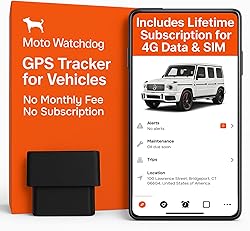
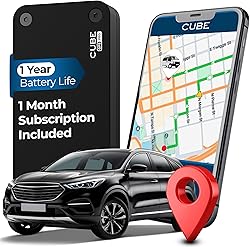
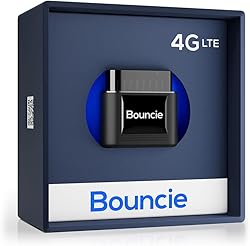

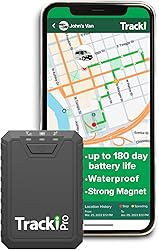
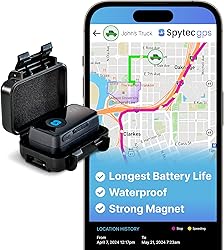

Hi, can I beg some advice please?
I’m looking for a good, inexpensive tracker which can be put on a Santa Sleigh which goes around our town during December evenings. The idea is that any of the residents can log on via a link on a website or Facebook and see where Santa is at any time.
Ideally, it would only operate when the Sleigh float (a trailer with 12v supply) is in use, so that the location won’t be visible when it is stored overnight / weekends.
Any suggestions please?
Hi Bob, happy to help if I can.
I haven’t dealt with that exact “Santa tracker” setup before, but the idea is totally doable with the right device. If your sleigh trailer has a 12V power feed you can tap into, I’d definitely look at the Optimus Wired GPS Tracker. Since it only runs when it gets power, you can wire it so the tracker goes live only when the sleigh is out on its route. Makes it easy for residents to follow Santa in real time, and it stays hidden when the trailer’s parked. Optimus also lets you share a public tracking link, which is perfect for a website or Facebook post.
If wiring isn’t convenient, a small portable option like Tracki can work too. It also supports shared live tracking, but you’d have to switch it off or remove it when the sleigh’s stored so the location doesn’t stay visible in off-hours.